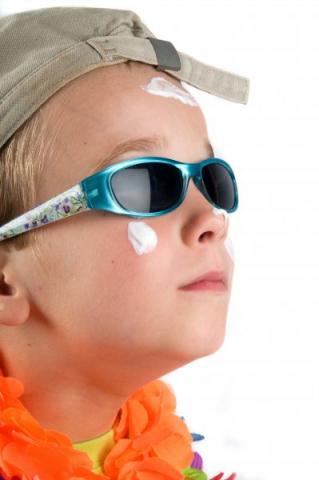Don’t sizzle in the sun during heatwave

With a spell of good weather expected, the Public Health Agency (PHA) and Cancer Focus Northern Ireland are offering advice on how to cope during the heatwave.
Dr Miriam McCarthy, Consultant in Public Health Medicine at the PHA, explained: “Being active and having fun outside is good for our health, but the sun can cause permanent damage to our skin. Just one episode of sunburn, especially in childhood, doubles the lifetime risk of malignant melanoma, the most serious form of skin cancer.”
There are a number of simple steps that will help protect against the sun’s harmful rays:
- Seek shade when the sun is at its strongest – generally 11am to 3pm.
- Cover up in the sun with a long sleeved t-shirt and a hat.
- Wear sunglasses that have one of the following, CE and British Standard Marks, carry a UV 400 label and offer 100% UV protection. This will ensure they provide adequate protection from both UVA and UVB. Sunglasses should fit your face well and relatively snugly so that light doesn't enter your eye from around the lens.
- Use sunscreen with a minimum SPF of 15 for UVB protection and 4-star for UVA protection. Apply liberally 30 minutes before going out in the sun and re-apply at least every two hours.
Marbeth Ferguson, Skin Cancer Prevention Coordinator at Cancer Focus NI, said: “It’s important to remember the care in the sun messages both at home and abroad. Everyone is at risk of sun damage, but certain groups are particularly at risk, including those with fair hair and skin, babies and children, outdoor workers and people with a family history of skin cancer. It is therefore vitally important that all of us take the necessary steps to protect ourselves in the sun and actively reduce the risks of skin cancer.”
Keep cool
High temperatures can bring other health risks, so it is also important to stay cool.
Dr McCarthy continued: “Most of us welcome hot weather, but when it's too hot for too long there are health risks. Knowing how to keep cool during long periods of hot weather can help save lives, so although showers are forecast this week, it will remain very warm so it is important to take steps to keep cool.
Some tips for staying cool are:
- Stay hydrated and drink cold drinks regularly, such as water and fruit juice. Avoid tea, coffee and alcohol.
- Wear loose, cool clothing, and a hat if you go outdoors.
- Shut windows and pull down the shades when it is hotter outside. If it's safe, open them for ventilation when it is cooler.
- Keep rooms cool by using shades or reflective material outside the windows. If this isn't possible, use light-coloured curtains and keep them closed (metallic blinds and dark curtains can make the room hotter).
- Have cool baths or showers, and splash yourself with cool water.
- Plan ahead to make sure you have enough supplies, such as food, water and any medications you need.
- Identify the coolest room in the house so you know where to go to keep cool.
“Prolonged heat poses a particular risk to older people, young people and those with heart and lung conditions, who may feel the effects of hot weather more acutely than others, so check up on friends, relatives and neighbours who may be less able to look after themselves,” concluded Dr McCarthy.
If you are concerned about skin cancer you can also call the Cancer Focus NI free information and support helpline on 0800 783 3339 or email one of the charity’s nurses on helpline@cancerfocusni.org
- Skin cancer is the most common cancer in Northern Ireland and accounts for 30% of all cancers diagnosed here - around 3,550* people develop it each year. While most skin cancers are not malignant the most severe form, malignant melanoma, can be a potentially life threatening condition, particularly if not diagnosed in the early stages. (*average number per year from 2008-2012. Ref. NI Cancer Registry)
- It is important to check skin regularly for suspected skin cancers. Check the whole body as skin cancer can occur in places not normally exposed to the sun. Be aware of any new spots, or existing spots that have changed colour, size or shape. A skin cancer may be a spot that bleeds easily, never heals properly or is always itchy. If an unusual spot is identified, show this to a doctor. Most skin cancers can be treated successfully if treated early.
- The Public Health Agency is the lead organisation for the implementation of the Skin Cancer Prevention Strategy and Action Plan 2011-2021 launched in July 2011.
- Building on the work of the former Northern Ireland Melanoma Implementation Group (NIMSIG), a Skin Cancer Strategy Implementation Group, jointly chaired by the Public Health Agency and Cancer Focus Northern Ireland, has been established to take forward the six objectives contained in the Strategy and Action Plan.
- The Skin Cancer Strategy Implementation Group is a multi-agency group which includes representatives from the Public Health Agency, Cancer Focus Northern Ireland, the Department of Health, Social Services and Public Safety, Environmental Health, General Practice, Pharmacy, the Belfast Health & Social Care Trust, the Northern Health & Social Care Trust, the South Eastern Health & Social Care Trust, the Southern Health & Social Care Trust, the Western Health & Social Care Trust, the Health & Safety Executive Northern Ireland and the Northern Ireland Cancer Registry.
